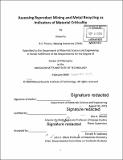Assessing byproduct mining and metal recycling as indicators of material criticality
Author(s)
Fu, Xinkai.
Download1135979136-MIT.pdf (26.93Mb)
Other Contributors
Massachusetts Institute of Technology. Department of Materials Science and Engineering.
Advisor
Elsa A. Olivetti.
Terms of use
Metadata
Show full item recordAbstract
The development of advanced technologies relies on using a broader suite of elements from the periodic table, and many agree that the future availability of a set of 'critical materials' is an issue of global concern. However, assessments of material criticality are often overly general, leading to excessive concerns by policy makers and market participants. A quantitative and detailed investigation for supply risk indicators is necessary to further understand the risk associated with specific materials. This thesis investigates two aspects related to material criticality: 1) the status of a metal being produced as a byproduct; 2) The market impact of increased metal recycling. To identify the type of major risks associated with a byproduct metal, a techno-economic analysis is performed on 42 carrier-byproduct metal pairs, by employing cluster analysis and econometric modelling. Contrary to conventional view, it is found in several case studies that the availability of a byproduct metal is not directly limited by carrier supply, but rather limited by the lack of incentive to improve recovery efficiencies. Therefore, developing alternative extraction processes with high recovery rate is proposed as a mitigation strategy for byproduct metals. The economic feasibility of such processes is examined, first in a screening assessment and then in a detailed case study for extracting indium as byproduct of zinc. It is demonstrated that an alternative process could significantly increase byproduct supply, by up to 10% in the case of indium. A bottom-up copper market simulation system is developed by modeling the behaviors of market participants, to estimate the market impact of increased metal recycling. Results from the simulation demonstrates the existence of various rebound effects for primary copper production. Depending on the size and duration of secondary supply shocks, these rebound effects can offset 50% to 90% of the environmental benefits of recycling. In terms of carrier recycling impacting byproduct supply, it is shown that recycling as carrier metal supply risk mitigation strategy would not significantly hurt the availability of byproduct metal.
Description
Thesis: Ph. D., Massachusetts Institute of Technology, Department of Materials Science and Engineering, 2019 Cataloged from PDF version of thesis. Includes bibliographical references (pages 170-184).
Date issued
2019Department
Massachusetts Institute of Technology. Department of Materials Science and EngineeringPublisher
Massachusetts Institute of Technology
Keywords
Materials Science and Engineering.